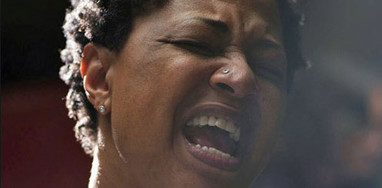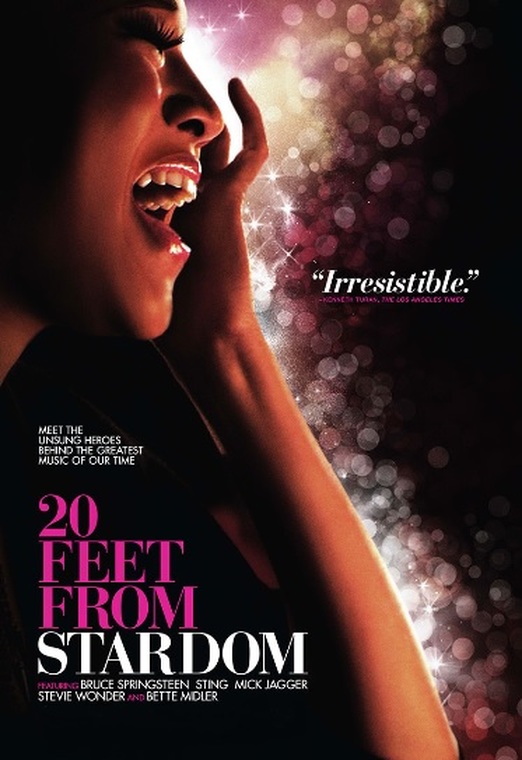
CAST & CREW
Backup Singers Heard on Some of the most Popular and Durable Recordings of the Past 50 Years
Directed Directed by Morgan Neville
Running time: 90 minutes
No MPAA rating
Backup Singers Heard on Some of the most Popular and Durable Recordings of the Past 50 Years
Directed Directed by Morgan Neville
Running time: 90 minutes
No MPAA rating
Reviewed by A. O. Scott – New York Times Times
The song that plays over the opening titles of “20 Feet From Stardom,” Morgan Neville’s new documentary, is Lou Reed’s “Walk on the Wild Side,” a provocative choice and also an appropriate one. The notorious lyrics of the chorus — “and the colored girls sing/doo, da-doo, da-doo, doo doo doo doo ... ” — establish the movie’s subject and also its reason for being. This generous, fascinating documentary about the careers of backup singers, most of them African-American women, seeks to rewrite the history of pop music by focusing attention on voices at once marginal and vital.
With the splendid exception of Darlene Love, who was inducted into the Rock and Roll Hall of Fame in 2011, most of the vocalists interviewed on screen are not well known, even though they can be heard on many of the most popular and durable recordings of the past half-century. Ms. Love, who did not receive proper credit for her singing on a number of Phil Spector-produced hits of the ’60s, worked as a house cleaner before claiming a rightful place in the spotlight in more recent decades.
The film includes many other stories of solo careers that did not quite happen. One of its themes is the mysterious combination of luck, ambition and prejudice that keeps some hugely talented musicians in the shadows while others, perhaps less gifted, become big stars.
Some of the people who reflect on this situation are very big stars themselves, like Sting, Bruce Springsteen and Mick Jagger. Their praise of the backup singers they’ve worked with is sincere and insightful, but their presence also emphasizes the gender and racial imbalances that are as deeply ingrained in popular music as bass, guitar and drums.
As Mr. Springsteen notes, the give-and-take between the lead vocalist and the supporting chorus has its roots in the call-and-response of the black church, where most of the singers in the movie started out. Many of them are the daughters of preachers, and one, Dr. Mable John, has come full circle. A former Raelette, who oohed and aahed alongside Ray Charles, she is now a pastor and the founder of the Joy in Jesus Ministries in Los Angeles.
“20 Feet From Stardom” is a chronicle of exploitation and appropriation — in other words, the music business — and also a series of tales of professional commitment and artistic triumph. The picture it paints is gratifyingly complicated. Some singers who came up in the highly disciplined rhythm-and-blues milieu of the 1960s felt liberated when white rock acts like the Rolling Stones came along and encouraged them to be, as more than one pointedly puts it, “blacker.”
Merry Clayton tells of being summoned to a recording studio in the middle of the night, pregnant and with her hair in curlers, to record an incendiary vocal track on “Gimme Shelter.” Claudia Lennear was an integral part of the Stones’ shows in the early ’70s, as Lisa Fischer, a singer of truly prodigious range and delicacy, has been since 1989.
Ms. Clayton also sang on Lynyrd Skynyrd’s “Sweet Home Alabama,” a song whose Southern-pride message she found more than a little alienating. Her account of how the presence of her voice subverts some of the political intentions of the record is almost convincing. But her performance of Neil Young’s “Southern Man,” captured on a television broadcast sometime in the ’70s, is a revelation. Backed by a funk band and sporting a cloud of “natural” hair, she turns Mr. Young’s earnest, scolding indictment of Southern racism (which partly provoked Lynyrd Skynyrd’s defensive anthem) into a tour de force of rage, passion and defiant virtuosity. You see how a singer can transform a song.
You see a lot of that in “20 Feet From Stardom,” which invites you to listen with new ears to songs you thought you knew, including David Bowie’s “Young Americans” and some of Sting’s recent work. The film is more about spirit than about technique, which is understandable but also perhaps a bit disappointing. The human voice is a mysterious, powerful instrument, and it would be good to learn more about its secrets from those who have mastered them. But in the end the demonstration of that mastery may be more satisfying than the analysis of it, and matching new faces to voices we already know is a gift for music fans. Discussion immediately following the film.
The song that plays over the opening titles of “20 Feet From Stardom,” Morgan Neville’s new documentary, is Lou Reed’s “Walk on the Wild Side,” a provocative choice and also an appropriate one. The notorious lyrics of the chorus — “and the colored girls sing/doo, da-doo, da-doo, doo doo doo doo ... ” — establish the movie’s subject and also its reason for being. This generous, fascinating documentary about the careers of backup singers, most of them African-American women, seeks to rewrite the history of pop music by focusing attention on voices at once marginal and vital.
With the splendid exception of Darlene Love, who was inducted into the Rock and Roll Hall of Fame in 2011, most of the vocalists interviewed on screen are not well known, even though they can be heard on many of the most popular and durable recordings of the past half-century. Ms. Love, who did not receive proper credit for her singing on a number of Phil Spector-produced hits of the ’60s, worked as a house cleaner before claiming a rightful place in the spotlight in more recent decades.
The film includes many other stories of solo careers that did not quite happen. One of its themes is the mysterious combination of luck, ambition and prejudice that keeps some hugely talented musicians in the shadows while others, perhaps less gifted, become big stars.
Some of the people who reflect on this situation are very big stars themselves, like Sting, Bruce Springsteen and Mick Jagger. Their praise of the backup singers they’ve worked with is sincere and insightful, but their presence also emphasizes the gender and racial imbalances that are as deeply ingrained in popular music as bass, guitar and drums.
As Mr. Springsteen notes, the give-and-take between the lead vocalist and the supporting chorus has its roots in the call-and-response of the black church, where most of the singers in the movie started out. Many of them are the daughters of preachers, and one, Dr. Mable John, has come full circle. A former Raelette, who oohed and aahed alongside Ray Charles, she is now a pastor and the founder of the Joy in Jesus Ministries in Los Angeles.
“20 Feet From Stardom” is a chronicle of exploitation and appropriation — in other words, the music business — and also a series of tales of professional commitment and artistic triumph. The picture it paints is gratifyingly complicated. Some singers who came up in the highly disciplined rhythm-and-blues milieu of the 1960s felt liberated when white rock acts like the Rolling Stones came along and encouraged them to be, as more than one pointedly puts it, “blacker.”
Merry Clayton tells of being summoned to a recording studio in the middle of the night, pregnant and with her hair in curlers, to record an incendiary vocal track on “Gimme Shelter.” Claudia Lennear was an integral part of the Stones’ shows in the early ’70s, as Lisa Fischer, a singer of truly prodigious range and delicacy, has been since 1989.
Ms. Clayton also sang on Lynyrd Skynyrd’s “Sweet Home Alabama,” a song whose Southern-pride message she found more than a little alienating. Her account of how the presence of her voice subverts some of the political intentions of the record is almost convincing. But her performance of Neil Young’s “Southern Man,” captured on a television broadcast sometime in the ’70s, is a revelation. Backed by a funk band and sporting a cloud of “natural” hair, she turns Mr. Young’s earnest, scolding indictment of Southern racism (which partly provoked Lynyrd Skynyrd’s defensive anthem) into a tour de force of rage, passion and defiant virtuosity. You see how a singer can transform a song.
You see a lot of that in “20 Feet From Stardom,” which invites you to listen with new ears to songs you thought you knew, including David Bowie’s “Young Americans” and some of Sting’s recent work. The film is more about spirit than about technique, which is understandable but also perhaps a bit disappointing. The human voice is a mysterious, powerful instrument, and it would be good to learn more about its secrets from those who have mastered them. But in the end the demonstration of that mastery may be more satisfying than the analysis of it, and matching new faces to voices we already know is a gift for music fans. Discussion immediately following the film.






